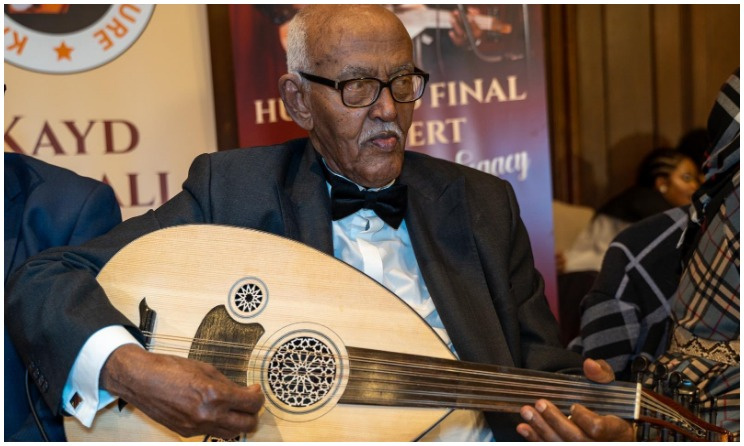Somali king of oud Ahmed Ismail Hussein dies of COVID-19
Legendary UK-based Somali musician Ahmed Ismail Hussein has died of complications related to the coronavirus (COVID-19).
 Ahmed Ismail Hussein 'Hudeydi'.
Ahmed Ismail Hussein 'Hudeydi'.
Hussein, who was known as 'Hudeydi' and 'The King of Oud', died at Charing Cross Hospital in London on 8 April. He was 92.
His death was announced on Twitter by Hanna Ali, the director of the London-based Kayd Somali arts organisation.
"Today the Somali community around the world has lost a hero – Ahmed Ismail Hussein Hudeydi – one of the founding fathers of modern Somali music, lost to COVID-19. I am utterly devastated," she wrote.
Dur Dur Band International manager Liban Noah told Music In Africa that Hudeydi was an inspiration to many Somalis around the world. He said the musician would be missed for his personality and unforgettable songs such as 'Uur Hooyo' (A Mother’s Womb) – a dedication to his brother whom he had not seen in 10 years at the time he wrote the song.
"He was a well-known Somali music legend," Noah said. "He wrote many famous songs but most people remember him through his lute playing skills . He once said during an interview with the BBC in 2003, 'I loved rock and roll music, that’s why they call me The King of Oud.'
"I worked with Hudeydi since 2003 when I was fundraising for the Hargeisa National Theatre. Later on we worked together as he played at various festivals and wedding parties. In 2005 and 2006, I booked him to play at the Oslo Mela festival. The last time we were together was in London on 8 February for his last show to celebrate his retirement, organised by Kayd."
Hudeydi was born in the port city of Berbera in Somaliland in 1928 and was first introduced to music at the age of 14 when he was living in Aden, Yemen. He returned to Somaliland as a young man and in 1947 his father sent him to join the Royal Navy in Portsmouth, England, to keep him away from music and musicians. However, this did not stop his love for music. In 1960, when Somaliland gained independence from Britain, he was among those who performed at Freedom Park.
Hudeydi was one of the founders of the Waaberi music troupe, which was established in the late 1960s. As a musician, he travelled and played in many countries including China, Ukraine, Nigeria, Sudan and Zaire, where he performed at The Rumble in the Jungle boxing match.
His music life spanned the colonial, post-independence and post-civil war periods. His music embodied the themes of freedom and independence. At some point in his life, he was detained by French colonial authorities for campaigning for Djibouti's independence.




















Commentaires
s'identifier or register to post comments